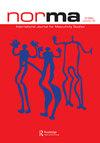Poetic desirability: refugee men’s border tactics against white desire
IF 1.5
Q2 SOCIOLOGY
引用次数: 0
Abstract
ABSTRACT This article explores how former refugee men position their desirability as they un-settle in European countries. The masculine performance of desirability is examined through the intersectional lens of racialization, affective bordering, sexualities, and erotic encounters. The paper builds on multi-sited ethnographies, conducted mainly in Greece and Germany between 2012 and 2022, centred around masculinities in border activist movements. During first encounters, the men in this study would position themselves as autonomous desirable beings. However, they quickly experienced dismissal or sexual objectifications. They were sexually desired as exotic but discarded as potential life partners, due to the lack of aspirational labour and uncertain legal status. Thus, their beings became depleted in the technologies of the white desire that exploits marked bodies. In affective response, they negotiated the terms of their recognition. Their tactics included shaming women’s choices, deflating local men’s hegemony, forming reciprocal contracts, and visioning love in the future. This pattern continued through men’s engagements across European borders and was repetitive. Therefore, I argue that they performed a ‘poetic desirability’ to position their masculine beings as equal and in resistance to the bordering violence of white (un)desire.诗意的渴望:难民男性对抗白人欲望的边境策略
本文章由计算机程序翻译,如有差异,请以英文原文为准。
求助全文
约1分钟内获得全文
求助全文
来源期刊

NORMA
Social Sciences-Gender Studies
CiteScore
3.00
自引率
14.30%
发文量
23
期刊介绍:
NORMA is an international journal for high quality research concerning masculinity in its many forms. This is an interdisciplinary journal concerning questions about the body, about social and textual practices, and about men and masculinities in social structures. We aim to advance theory and methods in this field. We hope to present new themes for critical studies of men and masculinities, and develop new approaches to ''intersections'' with race, sexuality, class and coloniality. We are eager to have conversations about the role of men and boys, and the place of masculinities, in achieving gender equality and social equality. The journal was begun in the Nordic region; we now strongly invite scholarly work from all parts of the world, as well as research about transnational relations and spaces. All submitted manuscripts are subject to initial appraisal by the Editors, and, if found suitable for further consideration, to peer review by independent, anonymous expert referees. All peer review is double blind and submission is online via Editorial Manager.
 求助内容:
求助内容: 应助结果提醒方式:
应助结果提醒方式:


